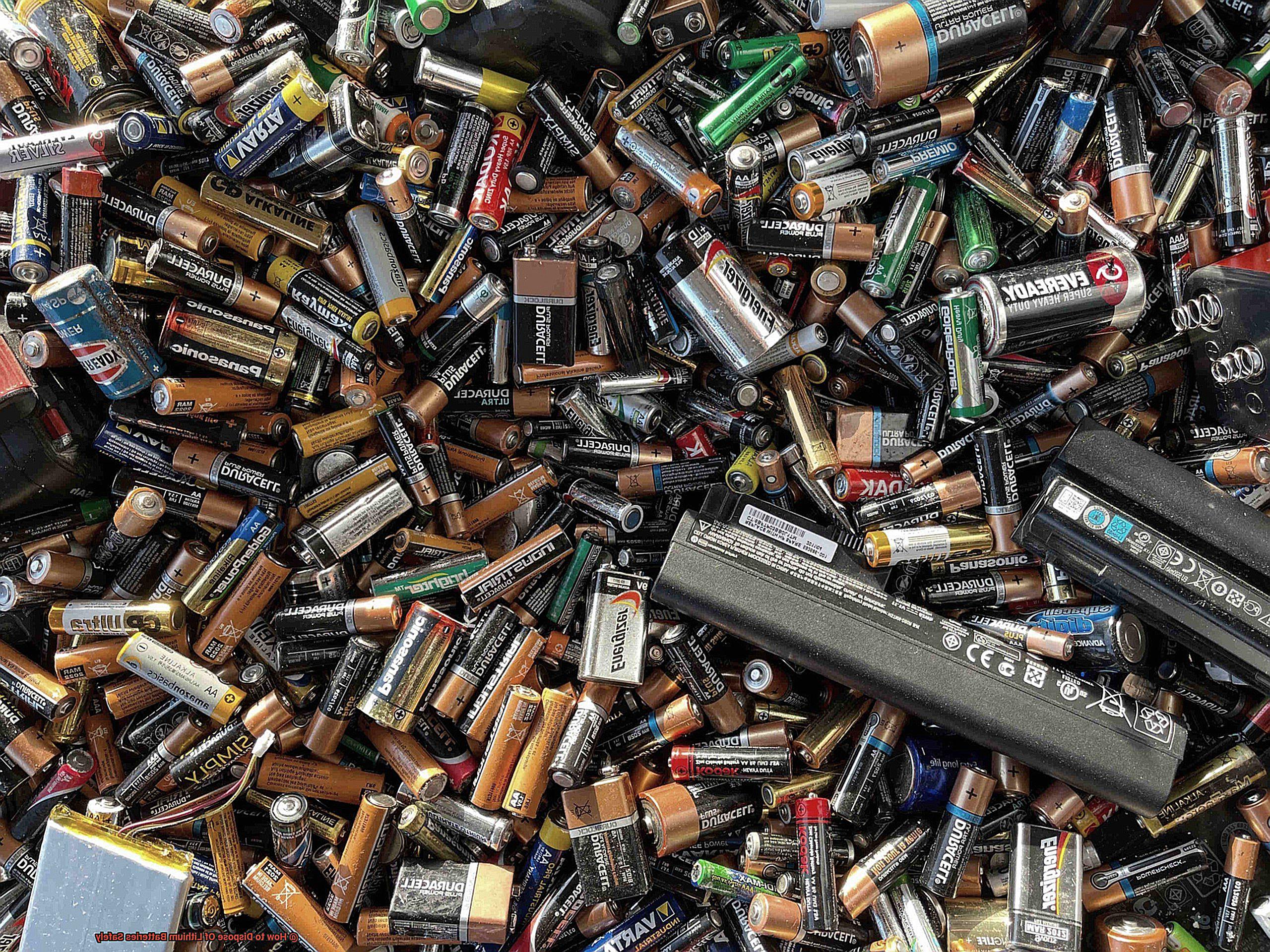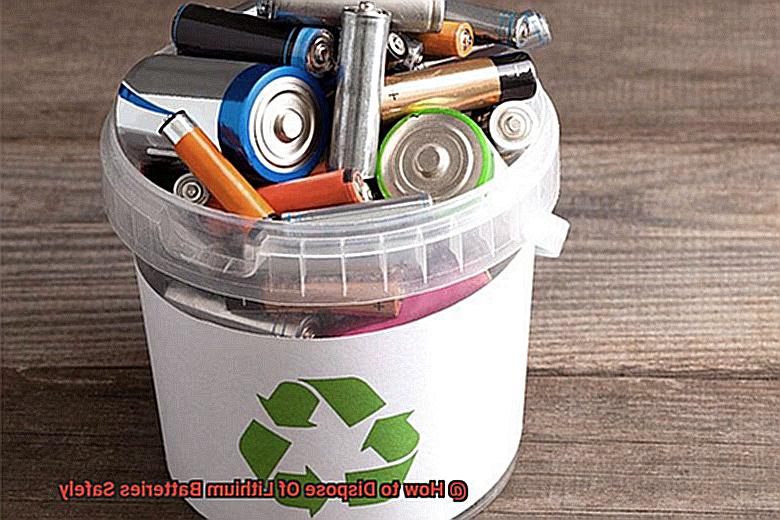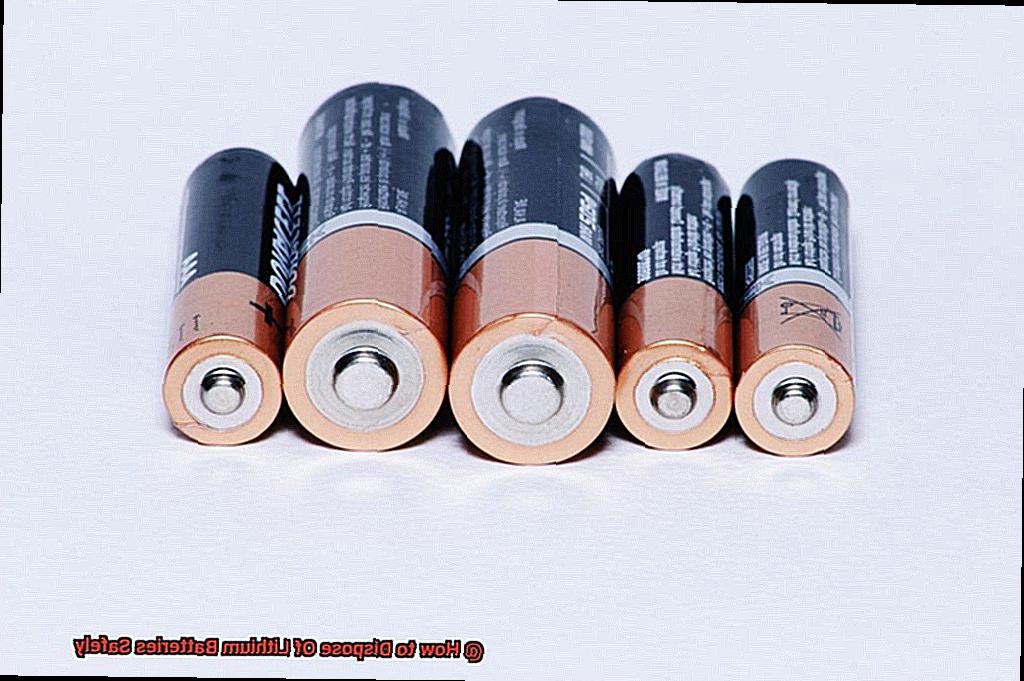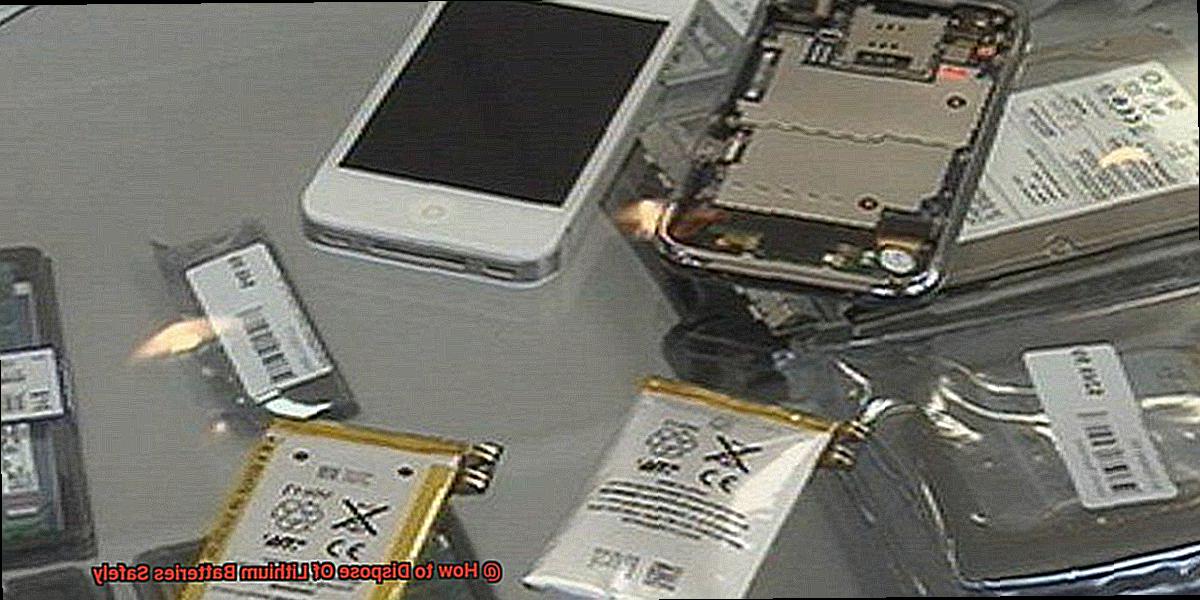Lithium batteries are dangerous. If not disposed of properly, they can cause fires, explosions, and even serious health issues. We’ll explore the most effective and eco-friendly ways to dispose of lithium batteries in this blog post.
Did you know that lithium batteries contain volatile metals and chemicals? These can harm the environment if not treated correctly. That’s why disposing of them is so important – it helps protect both the climate and people from potential danger.
So how should you get rid of old or broken lithium batteries? First, check with your local recycling center or hazardous materials disposal center for their instructions on proper disposal. Most places will require that all lithium batteries be sealed in an approved container before being dropped off at the facility.
If there isn’t a recycling center or hazardous waste disposal facility near you, contact your local government office for information on how to dispose of the battery safely. In some states, throwing away lithium batteries is illegal because they contain hazardous chemicals that can pollute soil and water if not treated properly.
We’ll explain how to dispose of lithium batteries safely in this blog post. From finding out where your local recycling center is located to knowing what kind of container is needed for proper disposal – we hope this information helps keep everyone safe from potential danger.
Where Can You Take Your Lithium Batteries for Recycling?
Contents
- 1 Where Can You Take Your Lithium Batteries for Recycling?
- 2 What Should You Do if You Live in Florida?
- 3 Why You Should Never Throw Away Lithium Batteries in the Trash
- 4 The Dangers of Mixing Different Types of Batteries
- 5 Steps for Properly Disposing of Lithium Batteries
- 6 How to Find a Battery Recycling Center Near You
- 7 What Happens to Old Batteries After They Are Recycled?
- 8 Conclusion
Lithium batteries are hazardous materials that can cause fires, chemical explosions, and environmental damage if not disposed of properly. The most responsible way to get rid of these batteries is to take them to a certified recycling center.
You can easily find a recycling facility near you. Most cities and counties have designated drop-off points or scheduled pick-up days for hazardous wastes, including lithium batteries.
Additionally, many retailers such as Best Buy, Home Depot, and Staples offer free battery recycling services. Electronic waste recycling centers that specialize in the disposal of electronic devices are also available if you need a collection or pick-up service.
Before taking your lithium batteries to a recycling center, make sure they are not damaged or leaking and that all personal data on any electronic device has been erased. Also confirm that the recycling center you choose is licensed and certified to handle hazardous wastes.
Recycling lithium batteries is essential for protecting our planet and keeping our communities safe – so don’t hesitate.
What Should You Do if You Live in Florida?
Living in Florida and have a few old lithium batteries lying around? Don’t worry, you can easily dispose of them safely and responsibly.
It is illegal to throw lithium batteries away in regular trash in Florida as they contain toxic chemicals that can be released into the environment if not disposed of properly. The best way to ensure safe disposal is to take them to a recycling center or drop-off location near you.
Many recycling centers in Florida accept all types of batteries, including lithium-ion batteries. What’s more, some retail stores that sell batteries may even offer incentives for bringing in old batteries, such as discounts on new battery purchases.

Before disposing of the lithium batteries, make sure to discharge them first. This will reduce the risk of thermal runaway, which can occur when batteries with a charge are exposed to heat or stored incorrectly.
Why You Should Never Throw Away Lithium Batteries in the Trash

When it comes to disposing of lithium batteries, it is essential to remember that they should never be thrown away in the trash. Not only is this illegal in many states, but these batteries also pose a significant risk to both the environment and personal safety.
To begin with, lithium batteries contain hazardous materials such as lithium, cobalt, and nickel which can cause severe contamination if not properly handled. This contamination can lead to soil and water pollution, putting both humans and animals at risk.
Additionally, most states have laws prohibiting the disposal of lithium batteries in the trash due to their potential danger.

Furthermore, throwing away lithium batteries in the trash can present a safety hazard. If these batteries come into contact with other metal objects or are punctured, they may overheat, leak, or even explode. This risk of fire is even more significant when lithium batteries are not disposed of appropriately.
Therefore, it is essential to note that throwing lithium batteries into the trash can lead to environmental, legal, and safety repercussions.
The Dangers of Mixing Different Types of Batteries

When it comes to disposing of lithium batteries, safety should always be the top priority. Mixing different types of batteries can cause dangerous chemical reactions that can lead to fires or explosions. Not only that, improper disposal of lithium batteries can also have a detrimental effect on the environment.
To ensure safe disposal, here are some tips to keep in mind:
Separate lithium batteries from other battery types
Mixing different kinds of batteries can create hazardous chemical reactions, so make sure they are handled appropriately before disposing of them.
Avoid puncturing or damaging a lithium battery; puncturing or damaging a lithium battery can cause hazardous chemicals to leak out, so handle with care and caution.
Store in a cool, dry place
Lithium batteries should be kept in a cool and dry area away from sources of heat or ignition.
Recycle properly
Don’t throw lithium batteries in the trash bin. Many communities have battery recycling centers, and some stores have recycling programs as well. Take your old lithium batteries to Household Hazardous Waste Collection Centers (HHW) or The Big Bend Resource Recovery Facility for free disposal in Florida.
It’s important to note that throwing away lithium batteries is not only unsafe but also illegal in several states, including Florida.
Steps for Properly Disposing of Lithium Batteries
Properly disposing of lithium batteries is essential for both safety and environmental reasons. If not handled correctly, these powerful little powerhouses can cause serious harm, so it’s important to take the right steps for disposal. Here are some simple steps to ensure that your lithium batteries are disposed of safely and responsibly.
Identify the type of lithium battery you have. There are several types of lithium batteries available, each with different properties and requirements for disposal. To determine which model you have, check the label on the battery or device it came from.
Inspect your battery for any signs of damage or swelling. If it appears to be damaged or swollen in any way, do not attempt to dispose of it yourself as this could result in hazardous materials being released or even a fire or explosion. Contact a professional disposal service instead.
Locate a local recycling center or service that accepts lithium batteries. Many municipalities offer curbside battery recycling programs or designated drop-off locations, while online services may also be available – just be sure to verify their credentials and safety measures before using them.
Prepare the battery for disposal by covering any exposed ends or terminals with electrical tape and storing it in a plastic bag to prevent any leaks or spills. Do not puncture or crush the battery as this can create a fire hazard.
Drop off the prepared lithium battery at the recycling center or service, paying any applicable fees if necessary. Step 6
Follow up with any additional steps recommended by the recycling center or service, such as checking for potential environmental impact or contamination, or monitoring any local regulations regarding disposal.
How to Find a Battery Recycling Center Near You
Are you looking for a way to responsibly dispose of your old lithium batteries? If so, you aren’t alone. Lithium batteries are becoming increasingly popular due to their high energy density and long life. When it comes time to upgrade them, it’s essential to do so in an environmentally-friendly way. To help make this process easier, we’ve compiled five easy steps on how to find a battery recycling center near you.
Check with Your Local Municipality
Your local waste management department or environmental agency may have information about local recycling centers or drop-off locations for lithium batteries.
Utilize Online Resources
Websites such as Earth911 and Call2Recycle allow you to enter your zip code and find nearby battery recycling centers. Before dropping off any lithium batteries, be sure to read the website’s guidelines and regulations for battery disposal.
Investigate Retail Store Recycling Programs
Certain retail stores offer battery recycling services; for example, some Best Buy locations accept lithium batteries for recycling. Contact your local store to see if they provide this service.
Follow Safety Instructions
When dropping off lithium batteries at a recycling center, it is important to follow safety guidelines as these batteries can pose a fire hazard if not handled properly. Once placed in a recycling bin, the batteries should not be punctured or damaged in any way.
Do Your Part
Properly disposing of lithium batteries is both important for the environment and your safety, so be sure to recycle them responsibly.
What Happens to Old Batteries After They Are Recycled?
Recycling is the only responsible way to dispose of old batteries, as it prevents them from ending up in landfills and also recovers valuable materials that can be used to make new batteries or other products. So what happens to our old batteries after they are recycled?
At the recycling center, our old batteries are sorted by their chemistry and then cut open. Inside, metals like nickel, iron, and cobalt can be melted down and used in the production of new batteries. Plastics and electrolytes can either be burned or converted into fuel to power the recycling process.
Not all batteries can be recycled in the same way; lithium-ion batteries are more technically challenging because they contain flammable materials. However, researchers are developing more efficient and cost-effective methods for recycling them so that fewer end up in landfills.
Recycling old batteries is essential for protecting our environment and conserving natural resources.
Conclusion
The correct disposal of lithium batteries is essential for safeguarding our climate and keeping our communities safe. This blog post has provided the necessary information on how to dispose of these batteries safely and responsibly.
Remember: never throw lithium batteries in the trash.
They contain volatile substances that can be released into the atmosphere if not handled correctly. Additionally, combining different brands of batteries can cause dangerous chemical reactions that could lead to fires or explosions.
To ensure safe disposal, distinguish them from other battery types, avoid puncturing or damaging a lithium battery, store them in a cool, dry place, and recycle them properly at a Household Hazardous Waste Collection Center or The Big Bend Resource Recovery Facility.





